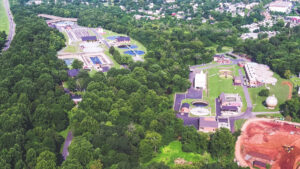Established in 1972, the Rivanna Water and Sewer Authority is a wholesale provider of potable water treatment and wastewater recovery operation. Rivanna, which is located in Albemarle County along the Rivanna River, is similar to other regional authorities in the mid-Atlantic, providing both water and wastewater services. Rivanna operates six water treatment facilities and four wastewater recovery facilities that treats approximately 11 million gallons of wastewater per day. The treated wastewater is returned to the Rivanna River, which flows to the James River, which in turn flows into the lower Chesapeake Bay.
Rivanna Water and Sewer Authority’s Board of Directors has decided that the utility compost all of its biosiolids, and does so with a unique partnership with McGill Environmental Systems. This relationship is essential to the communities served by the Authority. The wastewater service area includes the city of Charlottesville, Albemarle County and the towns of Scottsville and Crozet.
According to Dave Tungate, Director of Operations, it is the unseen utility workers who make municipal water and wastewater services available within Rivanna’s service territory. “We are a team,” he said. ”Our team of operators, maintenance workers, and administration staff work together to keep our water and wastewater services running 24-7. These services keep community healthy and vibrant, and our environment clean.”
“In the past we made compost at our Moores Creek facility and made it available to the general public. For the last 10 years, we haul all of our Biosolids to a third party (McGill Environmental), who recycles all of our biosolids into compost.”
“McGill Environmental takes our biosolids almost 365 days a year,“ Tungate said. “We are able to recycle our biosolids regardless of weather conditions. This is a real advantage for us since we do not have to store any biosolids or wait for appropriate conditions to beneficially use on farmland.”
Tungate continued, “I also think our community takes great pride in contributing to a commercially available compost product that is used all over the state.”
“Biosolids is a valuable commodity, and using it to create a product that can be beneficially used by the broader public is the right thing to do,” Tungate said. “We like the idea, and our community likes the idea of recycling our biosolids.”
While biosolids management decisions are focused on creating an Exceptional Quality (Class A) product, like other wastewater recovery facilities Rivanna and its leadership continue to focus on best practices associated with emerging contaminants of concern and most recently, COVID-19.
“Detection technology has increased both our understanding of our processes, while creating challenges,” Tungate said. Technology has enabled wastewater recovery and water treatment services to look at our processes more thoughtfully.
Rivanna, like other municipalities, are constantly racing to keep up with the technological changes that sometimes impact regulatory activity. Importantly, though, there is a global effort to use detection technologies to minimize and reduce the potential impacts to health and the environment.
Most recently, COVID-19 has created questions, both with process and operational questions. Rivanna and other facilities that treat municipal wastewater to standards that protect the beneficial uses of the local waters are wholly focused on protecting the community, the environment and its team. According to Tungate, “Sanitation experts have determined that existing treatment plant disinfection processes successfully disinfect wastewater containing the COVID-19 virus.” This is a case where available and modern technology and its use has allowed researchers to understand what happens to COVID-19 during treatment. “We also follow appropriate guidelines to ensure the safety of our employees at our facilities,” he said.
Looking to the future, Rivanna operates in an area of Virginia that is a growing and flourishing region of Virginia. “We are grateful to operate where we are. Our communities care deeply about the environment, and so do we – which is why we focus so much on making decisions that reflect the importance of health and safety – we do that today, and we do that as we look to the future,” he said.
For more information on CV-19 and composting, click here.

